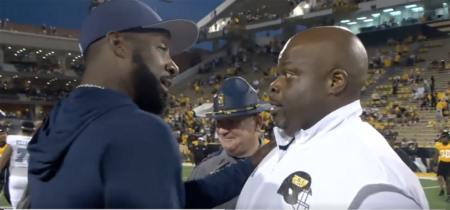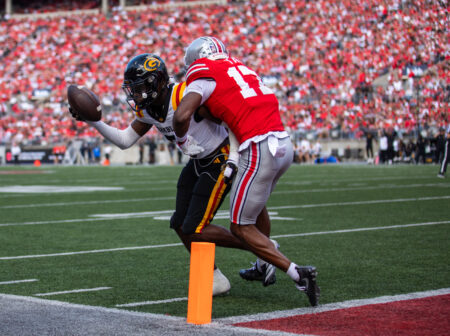Precious Brady-Davis, who works as the Sierra Club’s regional communications director, is campaigning to be one of the nine commissioners of the Metropolitan Water Reclamation District, which manages stormwater mitigation and wastewater treatment for Cook County. Brady-Davis, who grew up in public housing in Nebraska and was the first openly transgender contestant on the reality show Say Yes to the Dress: Atlanta, published a memoir, I Have Always Been Me, in 2021. The Reader interviewed her by phone recently. Brady-Davis fielded questions while caring for her two-year-old daughter Zayn, who she and her transmasculine husband Myles Brady Davis are raising together in their Hyde Park home. This interview has been edited for clarity and length.
Katie Prout: Could you start by talking a bit about your background?
Brady-Davis: Absolutely. For over 15 years, I’ve worked in nonprofit management. I started working at Chicago’s Center on Halsted, where I was the youth outreach coordinator for several years. After that, I went to work at Columbia College, where I oversaw national diversity recruitment.
After 2016, with the election of Donald John Trump, I felt that I couldn’t just sit on the sidelines of history as we watched Trump take action to remove all of these environmental protections. I knew this was just the beginning, that more environmental rights and environmental regulations would be slashed. And so, I went to work at the Sierra Club, on a campaign called Beyond Coal that works to retire coal plants.
Working at the Center on Halsted, I led a $1.6 million CDC HIV prevention grant. The MWRD is protecting the water for the citizens of Cook County, so it’s still an extension of protecting public health.
What does the MWRD do?
The Metropolitan Water Reclamation District is the agency that manages stormwater and wastewater. What the MWRD does is they take the water that leaves our home, they clean that water, and then they push it back out into [Lake Michigan]. That’s the essence of what the MWRD does: they protect the source of our drinking water.
They’re also the second-largest landowner in Cook County, so they manage public land. There’s a myriad of uses for that public land. They often lease much of it so that the taxpayers benefit from the revenue of those leases.
The nine commissioners are the folks who run the agency. They run the district, they oversee the budget, they create policy.
Nonprofit management is not new to me. I come to nonprofit management with a great deal of diversity, equity, and inclusion experience. I come to this work with a great gaze of creativity. What would it look like to see installations across Chicago, collaborating with artists to collect rainwater to ease the burden on our sewers? We could fund artists, and we could also educate the public about climate change. What would it look like to have decorative barrels across Chicago that store rain?
When and how did you first learn about the MWRD? What compelled you to try and join it?
I came to know about the MWRD because of Deb Shore. Deb Shore was a commissioner who served at the Metropolitan Water Reclamation District for 15 years. She was recently appointed by President Biden to be the Region Five EPA Administrator. She was also the first out lesbian, outside of a judge, who was elected in Cook County. I’ve long followed Deb’s career and have been inspired by her.
When I am elected, I will be the first Black trans woman elected in Chicago history. I’m also an environmentalist. I talk about having this history of diversity, equity, and inclusion: I see environmental justice as another diversity issue.
Why is diverse representation in public bodies important?
Far too often, I think the population being served isn’t actually reflected in the government, and often their needs don’t get met— particularly poor people, particularly people of color, people who are most impacted, you know, from climate change. I believe in inspiring the future, and particularly LGBTQ youth. We deserve to be in every sector of society, not just one. We have the right to sit in positions of power. We are qualified, we are our leaders. And I think [our election] helps change the stigma and the perception that LGBTQ folks, and trans people in particular, have faced.
How does MWRD interact with residents’ daily lives?
So let’s say that Lake Michigan is flooding, and it’s flooding your basement. The MWRD is responsible for that, but nothing that has to do with your water bill, and nothing to do with the water department: that is local and on the city. The flooding is on the county. If you’re having issues with stormwater around your home, the MWRD is responsible for that. You would reach out to one of the nine commissioners who are elected countywide.
How can folks learn more about the MWRD?
The MWRD has two in-person board meetings [a month]. They’re also online: folks can watch them virtually. Those meetings are open to the public, [but] I’d like to increase access to them as a commissioner. Currently, they happen at 10:30 AM. That’s not really accessible for the general public, for working-class people. So I think it’d be great to have more meetings at night.
The MWRD is also on social media. Every day, they do a historical photo of the agency [on Instagram]. There’s lots of cool details. I follow it, it’s very informative.
Is the MWRD an agency that can launch political careers in Cook County?
I think in Cook County, there’s a myriad of offices that you could say that about. I know that in this race in particular, there are folks who are standing behind certain candidates in this race, because they’ve circulated petitions for them. They actually don’t have qualified experience. I find that troubling and disheartening, and I don’t think it serves the residents of Cook County.
I think we need folks who understand the need to protect Lake Michigan and to protect the residents of our city. This is about public health. I mean, we’re seeing people across Cook County having to boil their water, like in Dixmoor. There are actual issues with the water. We need to actually advocate for people of color. When people of color make insurance claims on flooding, they often don’t become resolved. We need actual folks who are committed, solid public servants, and not people who just want to get a jumpstart to their political careers.
How is water quality a public health issue?
[Recreationally,] folks across Cook County want to enjoy the water. Folks want to enjoy the Little Calumet River, folks want to enjoy the Chicago River without getting contaminated.
If contaminants got into our water, it would make the water unsafe to drink. We absolutely saw, catastrophically, what happens when we don’t have solid leadership in positions of folks who care for our water. We saw what happened in Flint. The same thing could happen if we didn’t have solid leadership at the Metropolitan Water Reclamation District, and didn’t continue to have that leadership.
What are your top, hit-the- ground-running initiatives you’d be championing at the MWRD?
First, I want to prioritize environmental justice projects that advance community resilience. How can we support local communities? That would be one idea, creating a rain barrel project in a place like Englewood. Second, how do we increase and advance green infra- structure across Chicago? Third, engaging the stakeholders and increasing diversity in terms of people who are engaged in the work.
So [my priorities are] advancing community projects and community resilience, centering environmental justice, increasing green infrastructure, and then advancing community outreach, in particular to young people in marginalized communities. I think the MWRD can do violence prevention. They can engage young people in programs about the water reclamation district, and serve as an incubator to the trades, educating folks through community programs and community conversations.
How could MWRD work on violence prevention?
What would it be like to take marginalized young people from the south and west sides on a tour of one of the plants? What would it look like to have environmental programming for young people specifically? There’s a myriad of green spaces around Chicago, you know. We’d love to immerse young people in nature, in and outside of their communities across our great cities. I think that there’s more work that we can do, that I would champion as a commissioner. I would champion creating a task force to engage on environmental issues, and violence prevention should be one of those tenants.
The commissioners, the mayor, and the City Council should come together. Nothing in this conversation [about violence prevention] has come up about green space. There’s this current conversation in Chicago about where young people should be, and around public safety. And I think that nature should be in that equation.
Nature is a place where so many people find refuge, where they find relaxation, where they can experience centering. There’s more room for that, like community gardens where young people can help plant green infrastructure in their communities. If we want to actually create impact in communities, and we want to broaden the awareness of what the Metropolitan Water Reclamation does, then we need to do innovative things that actually tangibly affect people’s lives. That’s work that I’m interested in doing.







